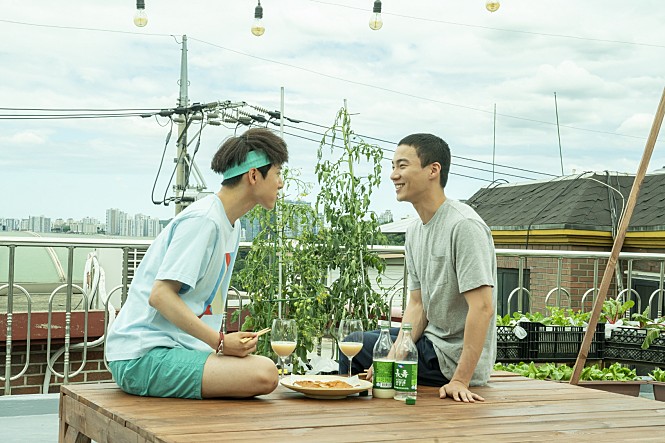South Korean film “Made in Rooftop” is a lightweight queer comedy drama which is a bit too corny and flamboyant for me. Maybe because I am a nerdy gay dude who is usually discreet and restrained in case of expressing personal feelings, I often found my eyes rolling as enduring a number of overtly comic or melodramatic moments in the film, and I was also disappointed with its rather thin narrative and superficial characterization.
At the beginning, the movie shows the recent breakup between Ha-neul (Lee Hong-nae) and his boyfriend Jeong-min (Kang Jung-woo). It later turns out that this is not the first breakup between them, and Ha-neul is already considering going back to Jeong-min, but, alas, Jeong-min does not allow him to enter his small one-room residence. As a result, Ha-neul is thrown into panic and disorientation as he needs to prepare for his impending job interview right now.
Anyway, Ha-neul eventually receives a sort of help from his close friend Bong-sik (Jung Hwi), who subsequently lets Ha-neul stay at his small but cozy rooftop residence for now. As a popular streamer who has many online followers, Bong-sik has enjoyed some luxuries as shown from his residence full of fancy and expensive stuffs, and Ha-neul is certainly impressed by what a cool hipster his friend is.
Promising to himself that he will have all the fun he can get before ending his life at 40, Bong-sik is not so interested in having any serious romantic relationship at present, but then he happens to have an unexpected encounter with a nice guy who turns out to be one of his longtime online followers. Because this guy actively approaches to him, Bong-sik eventually accepts the invitation to a gay bar where this guy works, and, after getting to know this guy a bit more, he agrees to have a date with this guy, though he still hesitates to open himself more to this guy.
Meanwhile, Ha-neul finds himself still conflicting over whether he can go back to Jeong-min, who, not so surprisingly, comes to miss Ha-neul a lot sooner than expected. Still angry about their strained relationship, Ha-neul chooses to reject Jeong-min’s sincere attempt to reconnect with him, but he soon regrets that a lot for what subsequently happens probably because of his choice. Quite depressed as a consequence, he comes to depend more on Bong-sik, and Bong-sik does not mind providing some solace to his friend along with his busybody neighbor living right below his rooftop residence.
And then Ha-neul belatedly comes to think of a certain important matter between him and Jeong-min. He hurriedly goes to Jeong-min’s residence, and that is how he comes to meet Jeong-min’s younger sister Jeong-yeon (Yeum Moon-keung, who wrote the screenplay along with director Kin-Jho Gwang-soo), who incidentally does not know anything about Ha-neul at all. As Ha-neul hides his relationship with Jeong-min, the mood between him and Jeong-yeon accordingly becomes more awkward, but Jeong-yeon is still willing to help him on that important matter in question anyway.
While Ha-neul tries to handle this increasingly awkward situation without getting his identity exposed to Jeong-yeon, the movie also pays attention to what is being developed between Bong-sik and the aforementioned guy. While Min-ho (Kwak Min-gyoo) becomes more willing to get closer to Bong-sik, Bong-sik turns out to have something he has hidden behind his seemingly cool appearance, and I bet that you can easily guess what he is going to tell, if, like me, you are a seasoned moviegoer quite familiar with many queer films out there.
The movie eventually let me down as resolving these two parallel conflicts in the story too easily and sentimentally, and I was also dissatisfied to see that the main characters in the film are more or less than shallow caricatures belonging to the realm of sitcom. In addition, several key scenes in the movie are blatantly silly or melodramatic to my distraction, and the certain key scene between Ha-neul and Jeong-yeon around the end of the story does not work as well as intended because of its rather stilted dialogue.
Anyway, the movie is likable to some degree because of the engaging performances from its good main cast members. Lee Hong-nae and Jung Hwi complement each other well as two different gay heroes, and I wish the movie explored more of the comic aspect of their accidental living under the same roof instead of getting melodramatic with their respective relationship problems. While Kwak Min-gyoo and Kang Jung-woo are suitably cast in their respective supporting roles, Lee Jung-eun and Yeum Moon-keung are adequate as two substantial female characters in the story, and Lee, who has been more prominent since her breakout supporting turn in Bong Joon-ho’s Oscar-winning film “Parasite” (2019), effortlessly steals the show whenever she enters the scene.
On the whole, “Made in Rooftop” is a well-intentioned but ultimately flawed work, and I cannot recommend it because it is too broad and superficial as a drama in addition to not being witty and funny enough as a comedy. If it had come around, say, 20 years ago, it certainly would have looked more notable and important to me and many other local sexual minority audiences out there, but, folks, there are much more accomplished South Korean queer films such as Park Chan-wook’s “The Handmaiden” (2016) and “Moonlight Winter” (2019), and I would rather recommend these two films instead.










